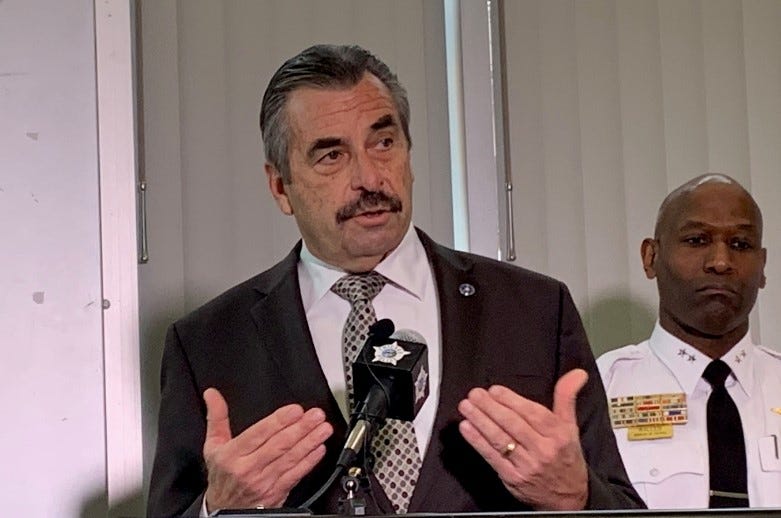
CHICAGO (WBBM NEWSRADIO) -- The Chicago Police Department announced Thursday a major restructuring plan that will streamline operations and deploy more than 1,100 police officers and detectives back to the city’s 22 police districts.
Chicago Police Interim Supterintendent Charlie Beck said the restructuring will make the Chicago Police Department more similarly structured to the New York and Los Angles police departments.
The new organization chart for the Chicago Police Department “is very similar to [those> two entities that I think are successful,” Beck told the Sun-Times.
The Chicago Police Department is going back to having five geographical areas of investigation, instead of three; and hundreds of detectives and narcotics and gang officers will move from specialized units to the police districts.
Interim Supt. Beck said this creates more of a geographic base for resources.
The department said the reorganization will change the connectivity between detectives, patrol, and counter-terrorism units to streamline the flow of information, intelligence and to provide for the maximum resources to be focused toward crime prevention and rapid response.
"This reorganization is about placing the maximum level of police resources closest to the communities that we serve," Beck said in a statement. "In addition to District accountability, the restructuring will bring more resources directly to communities under a single chain of command and elevate the reform effort that is crucial to the future of policing in Chicago. The Chicago Police Department has a wealth of talent in the organization, and this new structure will allow all of those critical human resources to more effectively work together in solving the most pressing challenges in the community, and to more effectively communicate with the community about our efforts to prevent and solve crime when it occurs."
While CPD has had a hiring surge over the last several years, self-imposed organizational barriers have caused a lack of staffing and resources in units and districts due to a lack of internal coordination between bureaus.
"To better improve cross-department collaboration, a new Office of Operations led by the First Deputy Superintendent will bring nearly 300 robbery, burglary, and theft detectives into CPD’s 22 police districts under the direction of the district commander, breaking down traditional silos of the old Bureaus of patrol, detectives and organized crime to allow for enhanced resource coordination accountable to one supervisory chain of command," the department said in a statement.
Additionally, the reorganization will move more than 800 gang intelligence and narcotics officers and additional detectives from centralized facilities directly into neighborhood facing Districts and Areas under the direction of area deputy chiefs.
"Creating a safer and stronger Chicago requires a strategic operational focus and approach," said First Deputy Superintendent Anthony Riccio, in a statement. "By shifting accountability back to the commands who know the needs of their communities best, enhancements will allow CPD to be more accountable and efficient while simultaneously giving Districts the added support and flexibility to respond to crime conditions."
The reorganization also prioritizes the efforts to transform the police department under the consent decree by combining all the functions tied to the reform effort under the command of a newly created Office of Constitutional Policing and Reform.
"The Chicago Police Department is working tirelessly to become a model of excellence in public service and constitutional policing that our entire city can be proud of," said Deputy Superintendent Barbara West, in a statement. "Our roadmap to get there lies in the consent decree that was developed by officers, residents and national experts, and I am privileged to build upon the progress towards creating a world-class agency."
Deputy Superintendent West will manage a wide range of reforms as part of the consent decree, including community policing, training, use of force, manpower and supervision, and the related issues of transparency and accountability.
Other changes to CPD includes creating its first Bureau of Counter-terrorism, aligning Chicago with national best practices and policing organizational models used in other major cities.
The department’s restructuring efforts will take place over the next several months in three phases.
